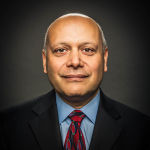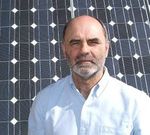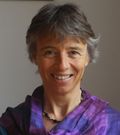Click here to register!
Difference between revisions of "Mini-grid Webinar Series"
***** (***** | *****) m |
***** (***** | *****) m (→Speakers) |
||
| Line 51: | Line 51: | ||
| [[File:Picture Xavier.jpg|left|150px|alt=Picture Xavier.jpg|link=Mini-grid Webinar Series]] | | [[File:Picture Xavier.jpg|left|150px|alt=Picture Xavier.jpg|link=Mini-grid Webinar Series]] | ||
| Xavier Vallvé holds engineering and Master’s degrees from the University of Waterloo in Canada and is co-founder and director of the engineering and consultancy firm Trama TecnoAmbiental (TTA) in Barcelona, Spain.He has more than 25 years of experience in renewable energy rural electrification and distributed generation projects, autonomous as well as grid tied, RE hybrid technology for islands and isolated villages. This involves complementary interdisciplinary activities in economic, social and management aspects as well as engineering in RE generation and storage. He has been project director or lead consultant for private and government clients and also for projects by UNDP, UNOPS, UNIDO, UNEP, AECID, IDB, WB, EC, IRENA and other agencies. He is director and lecturer of the Master degree “Master en Ingeniería y Gestión de las Energías Renovables” at IL3 (University of Barcelona).<br/>Member of ARE (Alliance for Rural Electrification), Member of the Board of Secartys | | Xavier Vallvé holds engineering and Master’s degrees from the University of Waterloo in Canada and is co-founder and director of the engineering and consultancy firm Trama TecnoAmbiental (TTA) in Barcelona, Spain.He has more than 25 years of experience in renewable energy rural electrification and distributed generation projects, autonomous as well as grid tied, RE hybrid technology for islands and isolated villages. This involves complementary interdisciplinary activities in economic, social and management aspects as well as engineering in RE generation and storage. He has been project director or lead consultant for private and government clients and also for projects by UNDP, UNOPS, UNIDO, UNEP, AECID, IDB, WB, EC, IRENA and other agencies. He is director and lecturer of the Master degree “Master en Ingeniería y Gestión de las Energías Renovables” at IL3 (University of Barcelona).<br/>Member of ARE (Alliance for Rural Electrification), Member of the Board of Secartys | ||
| + | |} | ||
| + | |||
| + | == Moderator == | ||
| + | {| | ||
|- | |- | ||
| − | + | | [[File:Picture Hedi.jpg|left|120px|alt=Picture Hedi.jpg|link=Mini-grid Webinar Series]]<br/> | |
| − | |||
| − | |||
| − | | [[File:Picture Hedi.jpg|left| | ||
| '''Hedi Feibel '''is a Renewable Energy and Water Expert at the Swiss Resource Centre and Consultancies for Development (Skat). She has worked for 25 years on assignments in Africa, Asia, the Caribbean and Europe with strong focus on mini and small hydropower. As an energy specialist and hydrologist, she is committed to knowledge transfer and participatory approaches to build up local know-how for the improvement of living conditions. She holds a PhD from the Department of Civil Engineering (Hydrology and Water Management) and Department of Political Economy, Darmstadt University of Technology, Germany. She holds a MSc in Geography / Hydrology, from the Institute of Hydrology, University of Freiburg, Germany.<br/> | | '''Hedi Feibel '''is a Renewable Energy and Water Expert at the Swiss Resource Centre and Consultancies for Development (Skat). She has worked for 25 years on assignments in Africa, Asia, the Caribbean and Europe with strong focus on mini and small hydropower. As an energy specialist and hydrologist, she is committed to knowledge transfer and participatory approaches to build up local know-how for the improvement of living conditions. She holds a PhD from the Department of Civil Engineering (Hydrology and Water Management) and Department of Political Economy, Darmstadt University of Technology, Germany. She holds a MSc in Geography / Hydrology, from the Institute of Hydrology, University of Freiburg, Germany.<br/> | ||
|} | |} | ||
<br/> | <br/> | ||
| + | |||
= 2nd Webinar: Grid-Interconnection = | = 2nd Webinar: Grid-Interconnection = | ||
Revision as of 09:01, 19 April 2017
|
Mini-Grids Webinar Series |
Renewable energy mini-grids are a widely discussed solution for cost-effective and reliable energy access. However, within the mini-grids dialogue micro and mini hydropower (MHP) is often overlooked, despite the large number of beneficial projects operating globally, particularly in rural regions of Asia, Africa, and Latin America.
Many MHP systems originated as water mills that were upgraded to generate electricity (e.g. Afghanistan, Pakistan, and northern India). Some have transitioned from isolated mini-grids to grid-interconnected systems (e.g. Indonesia and Sri Lanka). As a proven technology with a long track record, micro/mini hydropower is the focus of this webinar series, which will also analyze similarities and differences among the various mini-grid technologies. read more
Each webinar in the series will focus on a distinct and relevant topic, namely Technology Differentiation, Grid-Interconnection, and Productive End Use.
The objectives of this webinar series are to strengthen the sector by:
a) facilitating exchange among field practitioners, regional and international experts
b) creating awareness on up-to-date developments, barriers and opportunities.
[1] In this context, micro hydropower refers to <100kW, and mini hydropower refers to 100 - 1000 kW (or 1MW).
1st Webinar: Technology Differentiation
1st Webinar: Why do mini-grid technologies -- PV, biomass, diesel, micro/mini hydro, wind, and hybrid systems -- need to be differentiated?
Thursday, 4 May 2017 at 2:00 p.m CEST.
Register: https://attendee.gotowebinar.com/register/992555916115887619
“Mini-grids” have become increasingly popular in recent years because of
- The enormous cost of grid extension in rural areas as well as
- The limitations of household systems (e.g. solar home systems).
Often mini-grids based on different energy sources are simply lumped together when it comes to project and program design, calls for proposals, and in legal and regulatory frameworks. However, all mini-grids are not all the same. This webinar will highlight the important technical and non-technical features, as well as pros and cons of different technologies to create awareness on the need for differentiation of mini-grid systems.
The main objectives of the webinar are to provide:
- an impartial assessment of different RE technologies for electricity generation in mini grids based on facts and figures and experience from different countries
- an overview and framework for comparison (pros, cons, business models, ranges for specific cost per kW, generation cost per kWh, cost drivers, scalability, variability of the resource and related storage requirements etc.)
- key points to be considered when designing rural electrification programs with different RE technologies.
This webinar on mini-grid technologies is the first in a series of three webinars on mini-grids. Stay tuned for our upcoming webinars on -- Grid Interconnection (June 2017) and Productive End Use (July 2017).
Speakers
| Bikash Pandey is Director of Innovations for the Clean Energy, Environment and Water group at Winrock International. Pandey’s work experience encompasses 20 years in policy review, design and implementation of a range of clean/renewable energy projects in Africa, Latin America and Asia. A technical specialist in micro- and mini-hydropower systems, he has designed and implemented numerous community-based electrification, clean transportation projects, small-scale mini-grids, and home energy systems. He has extensive experience in developing small-scale renewable energy projects as activities under the Clean Development Mechanism. He also brings experience encouraging policy change within governments, bilateral and multilateral donors to support clean energy. He holds a master’s in energy and resources from the University of California at Berkeley, and a bachelor’s in electrical engineering from MIT. | |
| Xavier Vallvé holds engineering and Master’s degrees from the University of Waterloo in Canada and is co-founder and director of the engineering and consultancy firm Trama TecnoAmbiental (TTA) in Barcelona, Spain.He has more than 25 years of experience in renewable energy rural electrification and distributed generation projects, autonomous as well as grid tied, RE hybrid technology for islands and isolated villages. This involves complementary interdisciplinary activities in economic, social and management aspects as well as engineering in RE generation and storage. He has been project director or lead consultant for private and government clients and also for projects by UNDP, UNOPS, UNIDO, UNEP, AECID, IDB, WB, EC, IRENA and other agencies. He is director and lecturer of the Master degree “Master en Ingeniería y Gestión de las Energías Renovables” at IL3 (University of Barcelona). Member of ARE (Alliance for Rural Electrification), Member of the Board of Secartys |
Moderator
| Hedi Feibel is a Renewable Energy and Water Expert at the Swiss Resource Centre and Consultancies for Development (Skat). She has worked for 25 years on assignments in Africa, Asia, the Caribbean and Europe with strong focus on mini and small hydropower. As an energy specialist and hydrologist, she is committed to knowledge transfer and participatory approaches to build up local know-how for the improvement of living conditions. She holds a PhD from the Department of Civil Engineering (Hydrology and Water Management) and Department of Political Economy, Darmstadt University of Technology, Germany. She holds a MSc in Geography / Hydrology, from the Institute of Hydrology, University of Freiburg, Germany. |
2nd Webinar: Grid-Interconnection
As governments worldwide prioritize rural electrification, an increasing number of mini-grids built for rural communities are facing the “question” of what happens to the mini-grid when the national grid arrives. Whether this is a serious problem or rather a big opportunity for the community will depend on a number of parameters.
Grid interconnection of micro and mini hydropower (MHP) has emerged as an important topic in south and southeast Asia, driven by several factors:
- MHP facility owners’ need for long-term certainty in cases where the national grid is expanding into areas where isolated MHP mini-grids operate;
- Net metering, feed-in tariffs (FiT’s) and other policies and regulatory frameworks that support grid interconnected renewable energy;
- MHP’s ability to provide inexpensive renewable energy 24-hours a day, and the grid’s ability to absorb this electricity even at times of day (or night) when local loads are low;
- Country targets for increased domestic renewable energy production, lower carbon footprints, and increased electricity access.
This second webinar in the series will include
- Examples from Indonesia and Sri Lanka where micro hydropower systems have been successfully connected to the national grid and even benefited the local community.
- Country experts will describe how micro hydropower developed in their country, what happened when the grid arrived, as well as the current conditions for grid interconnection (e.g. feed-in tariff, technical requirements and economic aspects).
Speakers
- Chayun Budiono
Kapila Subasinghe, Head of Consulting, DFCC Bank, Srilanka
Moderator
- To be announced
3rd Webinar:Productive End Use
are recovered from tariffs, which depend on power consumption. Providing only lighting is a missed opportunity to bring optimal impact to economically marginalized rural communities. Micro/mini hydropower can generate many kWh's -- we need to learn how to make use of them!
Productive End Use (PEU) of energy refers to activities that increase income or productivity in different sectors such as agriculture (e.g. irrigation, grain milling), manufacturing (e.g. carpentry, welding, and sewing), and the service sector (e.g. restaurants using electric lights, sound systems, refrigerators, mobile charging stations).
This third webinar in the series will focus on PEU of mini/micro hydropower systems. It will examine
- The social and technical pre-conditions, such as load management and technical reliability, and options such as mechanical drive for agricultural processing.
- The increase of load factor through PEU and corresponding increase of the economic viability of the system.
- Three examples of systems promoting productive end use in different countries. It will present pros and cons of electrifying "existing activities” versus “new businesses”.
<headertabs></headertabs>
Organizers
| Energypedia UG is a non-profit organization that runs and maintains the wiki-based platform, www.energypedia.info. Energypedia.info is an online platform for collaborative knowledge exchange on renewable energy, energy efficiency and energy access in the context of development cooperation. | |
|
The Hydro Empowerment Network (HPNET), is a knowledge exchange and advocacy platform for micro/mini hydro practitioners in south and southeast Asia, focusing policy, technology, and socio-environment solutions for long-term sustainability. Core support for HPNET comes from the WISIONS initiative at the Wuppertal Institute for Climate, Environment and Energy. | |
|
Skat Foundation was established by Skat Consulting in 2002 to foster the exchange of knowledge and experience in development cooperation through generating, sharing and transferring knowledge about what works and how in selected thematic areas. Along with supporting the webinar, Skat Foundation has also funded this webinar series. |

























